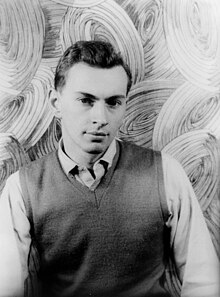
Back Gore Vidal AF غور فيدال Arabic جور فيدال ARZ Gore Vidal AST Qor Vidal AZ قور ویدال AZB Gore Vidal BCL Гор Відал BE Гор Видал Bulgarian Gore Vidal Catalan
Gore Vidal | |
|---|---|
 Vidal c. 1948 | |
| Born | Eugene Louis Vidal October 3, 1925 West Point, New York, U.S. |
| Died | July 31, 2012 (aged 86) Los Angeles, California, U.S. |
| Resting place | Rock Creek Cemetery (Washington, D.C.) |
| Other names | Eugene Luther Vidal Jr. |
| Education | Phillips Exeter Academy |
| Occupations |
|
| Known for |
|
| Political party |
|
| Movement | Postmodernism |
| Partners | See list
|
| Parents | |
| Relatives | See list
|
| Chairman of the People's Party | |
| In office November 27, 1970 – November 7, 1972 | |
| Military career | |
| Service | United States Army |
| Years of service | 1943–1946 |
| Rank | Warrant officer |
| Battles / wars | World War II |
Eugene Luther Gore Vidal (/vɪˈdɑːl/ vih-DAHL; born Eugene Louis Vidal, October 3, 1925 – July 31, 2012) was an American writer and public intellectual known for his acerbic epigrammatic wit.[1] His novels and essays interrogated the social and sexual norms he perceived as driving American life. Vidal was heavily involved in politics, and unsuccessfully sought office twice as a Democratic Party candidate, first in 1960 to the United States House of Representatives (for New York), and later in 1982 to the United States Senate (for California).
A grandson of U.S. Senator Thomas Gore, Vidal was born into an upper-class political family. As a political commentator and essayist, Vidal's primary focus was the history and society of the United States, especially how a militaristic foreign policy reduced the country to a decadent empire.[2] His political and cultural essays were published in The Nation, the New Statesman, the New York Review of Books, and Esquire magazines. As a public intellectual, Gore Vidal's topical debates on sex, politics, and religion with other intellectuals and writers occasionally turned into quarrels with the likes of William F. Buckley Jr. and Norman Mailer.
As a novelist, Vidal explored the nature of corruption in public and private life. His style of narration evoked the time and place of his stories, and delineated the psychology of his characters.[3] His third novel, The City and the Pillar (1948), offended the literary, political, and moral sensibilities of conservative book reviewers, the plot being about a dispassionately presented male homosexual relationship.[4]
In the historical novel genre, Vidal recreated the imperial world of Julian the Apostate (r. AD 361–363) in Julian (1964). Julian was the Roman emperor who attempted to re-establish Roman polytheism to counter Christianity.[5] In social satire, Myra Breckinridge (1968) explores the mutability of gender roles and sexual orientation as being social constructs established by social mores.[6]: 94–100 In Burr (1973) and Lincoln (1984), both part of his Narratives of Empire series of novels, each protagonist is presented as "A Man of the People" and as "A Man" in a narrative exploration of how the public and private facets of personality affect the national politics of the United States.[7]: 439 [6]: 75–85
- ^ Anon (2012). "Gore Vidal quotes: 26 of the best: Gore Vidal, the celebrated writer, has died aged 86. He was famous for his acerbic wit. Here are some of his best quotes". The Guardian. London.
Some writers take to drink, others take to audiences
- ^ Vidal, Gore (April 1, 2013). I Told You So: Gore Vidal Talks Politics: Interviews with Jon Wiener. Catapult. pp. 54–55. ISBN 978-1-61902-212-6.
- ^ Murphy, Bruce. Benét's Reader's Encyclopedia (4th ed.). HarperCollins Publishers (1996), p. 1080.
- ^ Terry, C. V. New York Times Book Review, "The City and the Pillar", January 11, 1948, p. 22.
- ^ Hornblower, Simon & Spawforth, Editors. The Oxford Companion to Classical Civilization Oxford University Press (1998), pp. 383–384.
- ^ a b Kiernan, Robert F (1982). Gore Vidal. Frederick Ungar Publishing. ISBN 9780804424615. Retrieved February 16, 2020.
- ^ Vidal, Gore (1995). Palimpsest: A Memoir. New York: Random House. ISBN 9780679440383. Retrieved February 16, 2020.